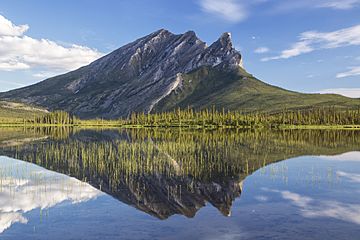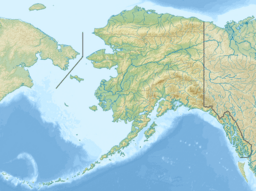Sukakpak Mountain facts for kids
Quick facts for kids Sukakpak Mountain |
|
|---|---|

Sukakpak Mountain, north aspect
|
|
| Highest point | |
| Elevation | 4,459 ft (1,359 m) |
| Prominence | 1,883 ft (574 m) |
| Isolation | 3.3 mi (5.3 km) |
| Parent peak | Dillon Mountain (4,820 ft) |
| Geography | |
| Location | Yukon–Koyukuk Alaska, United States |
| Parent range | Philip Smith Mountains Brooks Range |
| Topo map | USGS Chandalar C-6 |
| Geology | |
| Age of rock | Devonian |
| Type of rock | limestone, marble |
| Climbing | |
| Easiest route | Scrambling south ridge |
Sukakpak Mountain is a tall and famous mountain in Alaska, USA. It stands about 4,459 feet (1,359 meters) high. This mountain is part of the Philip Smith Mountains, which are found within the larger Brooks Range.
You can find Sukakpak Mountain far north in Alaska, about 90 miles north of the Arctic Circle. It's located near milepost 203 on the Dalton Highway. The mountain is also where two rivers, the Bettles and Dietrich Rivers, meet to form the Middle Fork Koyukuk River.
What's in a Name?
The name Sukakpak comes from the Iñupiat people. It means "marten deadfall". A deadfall is a type of trap used to catch animals like martens. From one side, the mountain looks like a carefully balanced log that would be used in such a trap. The United States Geological Survey (USGS) first reported this name in 1930. The U.S. Board on Geographic Names officially adopted it in 1932.
Special Features of the Mountain
Sukakpak Mountain is well-known for its west side. This side has a huge wall of limestone rock that rises almost 3,000 feet (900 meters) from the valley floor.
At the bottom of the mountain, you might see unusual mounds called palsas. These are small hills with a core of ice inside them.
In 1990, the Bureau of Land Management (BLM) named Sukakpak Mountain an Area of Critical Environmental Concern. This was done to help protect its amazing views and unique rock formations.
Weather in the Mountains
Sukakpak Mountain is in a subarctic climate zone. This means it has very long, cold winters and short, cool summers. Temperatures can drop below -30 °C (which is -22 °F). With the wind, it can feel even colder, sometimes below -50 °C (-58 °F).
The best time to visit or climb Sukakpak Mountain is during the summer months, from June to August. The weather is usually more pleasant then.
 | Precious Adams |
 | Lauren Anderson |
 | Janet Collins |


